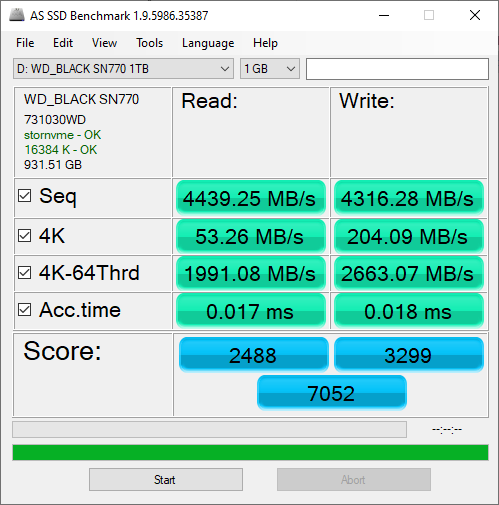TRIM Performance:
While SSDs offer many benefits, there are some downsides to using flash memory. One of the biggest issues people run into is performance degradation. Over time, an SSD will run out of fresh blocks and will have to write over data the file system has marked as deleted. This procedure is very complicated and can slow an SSD's write speeds considerably.
To fix this problem, most manufacturers have added TRIM support to their SSDs. The TRIM command allows an operating system, such as Windows 10, to tell an SSD which data blocks are no longer in use. Using this information, the drive pro-actively erases these blocks and adds them to the free block pool.

To test the WD_BLACK SN770's TRIM and garbage collection functions, I first put the drive in a "dirty" state. I used Iometer to fill 80% of the drive and then ran a random write test for 30 minutes. Looking at the screenshot below, you can see that the WD_BLACK SN770's average read and write speeds dropped to 3466.25 MB/s and 197.91 MB/s, respectively.

WD_BLACK SN770 - Dirty
To see how well the WD_BLACK SN770 could recover, I let the computer sit for about 30 minutes and then reran the test. The drive wasn't able to reach the factory fresh performance shown in our earlier tests. However, its sequential write speed climbed up to 4131.54 MB/s.

WD_BLACK SN770 - After TRIM
Lastly, I used Parted Magic to perform a secure erase on the WD_BLACK SN770. With the drive wiped clean, it had average read and write speeds of 4439.25 MB/s and 4316.28 MB/s, respectively.

WD_BLACK SN770- Secure Erased
Final Thoughts:
The WD_BLACK SN770 is an excellent choice for the gamer or enthusiast looking for a fast, yet affordable, PCIe 4.0 SSD for their desktop or notebook computer. Designed and built entirely in-house, this M.2 form factor SSD is powered by Western Digital's own 20-82-10081-A1 controller and is available with up to 2TB of the company's 112-layer BiCS5 3D TLC NAND flash. Combine this with a PCIe Gen4 x4 NVMe 1.4 interface and you have a drive that offers up to 40% faster performance than its predecessor, the SN750 SE. In our sequential read and write tests, the 1TB version of the WD_BLACK SN770 was able to read at speeds as high as 5,224 MB/s and write at speeds in excess of 4,900 MB/s. It also did fairly well in our random write tests, producing more than 164,000 IOPS at low queue depths, and scored better than many other, more expensive drives, in benchmarks like PC Mark 10.
The WD_BLACK SN770 is available now in 250GB, 500GB, 1TB and 2TB capacities. Prices on Amazon.com currently range from $53 up to $250, with the 1TB version reviewed here retailing for about $130.

Highs:
- Available in 250GB, 500GB, 1TB and 2TB capacities
- PCIe 4.0 x4 interface with NVMe protocol
- Equipped with 112-layer BiCS5 3D TLC NAND
- Very good sequential and random read and write speeds
- Small M.2 2280 form factor
- WD Black SSD Dashboard with "gaming mode"
- Reasonably priced
- 5 year warranty
Lows:
- Write speed drops considerably when SLC cache is full
- Does not support hardware based encryption

